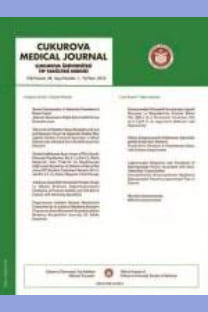Aile hekimliği polikliniğine başvuran hastalarda Aspirin kullanımının değerlendirilmesi
Aspirin, Bilgi düzeyi, Kardiyovasküler hastalıklar, Birincil koruma, İkincil koruma
Evaluation of Aspirin use in patients admitted to the family medicine outpatient clinic
Aspirin, knowledge levels, cardiovascular diseases, primary prevention, secondary prevention,
___
- 1. Vane JR, Botting RM. The mechanism of action of aspirin. Thromb Res. 2003;110:255-8.
- 2. Prado TM, Cincotto FH, Machado SAS. Spectroelectrochemical study of acetylsalicylic acid in neutral medium and its quantification in clinical and environmental samples. Electrochimica Acta. 2017;233:105-12.
- 3. Singh R, Tiwari MK, Gangopadhyay D, Mishra PC, Mishra H, Srivastava A et al. Detection and monitoring of in vitro formation of salicylic acid from aspirin using fluorescence spectroscopic technique and DFT calculations. J Photochem Photobiol B. 2018;189:292-7.
- 4. Değirmenci H. Aspirinle primer koruma kimlere yapalım? Erzincan Tıp Dergisi. 2018;1:55-9.
- 5. Bowman L, Mafham M, Wallendszus K, Stevens W, Buck G, Barton J et al. (ASCEND Study Collaborative Group). Effects of aspirin for primary prevention in persons with diabetes mellitus. N Engl J Med 2018;379:1529-39.
- 6. Piepoli MF, Hoes AW, Agewall S, Albus C, Brotons C, Catapano AL et al. 2016 European guidelines on cardiovascular disease prevention in clinical practice. Eur Heart J 2016;37:2315–81.
- 7. Peters RJ, Mehta SR, Fox KA, Zhao F, Lewis BS, Kopecky SL et al. Effects of aspirin dose when used alone or in combination with clopidogrel in patients with acute coronary syndromes: observations from the Clopidogrel in unstable angina to prevent Recurrent Events (CURE) study. Circulation. 2003;108:1682-7.
- 8. Sağlık Bakanlığı Türkiye İlaç ve Tıbbi Cihaz Kurumu Bilinçli Asetilsalisilik Asit Kullanımı. Erişim adresi: http://www.akilciilac.gov.tr/?page_id=2480 (Erişim tarihi: 03.02.2019).
- 9. Sağlık Bakanlığı. Türkiye Hanehalkı Sağlık Araştırması Bulaşıcı Olmayan Hastalıkların Risk Faktörleri Prevalansı . Ankara, Sağlık Bakanlığı, 2017:
- 10. Sağlık Bakanlığı Türkiye İlaç ve Tıbbi Cihaz Kurumu 16.01.2020 tarih ve 62820468-000-E.12525 sayılı Asetilsalisilik asit içeren tekli veya kombine ilaçlar hakkında. Erişim adresi: https://www.teis.org.tr/2020/01/21/titckasetilsalisilik-asit-iceren-tekli-veya-kombine-ilaclarhakkinda-duyuru-16-01-2020/ (Erişim tarihi: 28.01.2020).
- 11. Williams CD, Chan AT, Elman MR, Kristensen AH, Miser WF, Pignone MP et al. Aspirin use among adults in the US: results of a national survey. Am J Prev Med 2015;48:501-8.
- 12. Luepker RV, Oldenburg NC, Misialek JR, Hof JRV, Finnegan JR, Eder M et al. Aspirin use and misuse for the primary prevention of cardiovascular diseases. Am J Prev Med 2021;60:513-9.
- 13. Roth GA, Gillespie CW, Mokdad AA, Shen DD, Fleming DW, Stergachis A et al. Aspirin use and knowledge in the community: a population-and health facility based survey for measuring local health system performance. BMC Cardiovasc Disord. 2014;14:16.
- 14. Moore N, Ganse EV, Le Parc JM, Wall R, Schneid H, Farhan M et al. The PAIN Study: paracetamol, aspirin and ibuprofen new tolerability study. Clin Drug Invest 1999;18:89-98.
- 15. Bibbins-Domingo K, U.S. Preventive Services Task Force. Aspirin use for the primary prevention of cardiovascular disease and colorectal cancer: U.S. Preventive Services Task Force Recommendation Statement. Ann Intern Med 2016;164:836-45.
- 16. Chang CW, Horng JT, Hsu CC, Chen JM. Mean daily dosage of aspirin and the risk of incident alzheimer's dementia in patients with type 2 diabetes mellitus: a nationwide retrospective cohort study in Taiwan. J Diabetes Res 2016;2016:9027484.
- ISSN: 2602-3032
- Yayın Aralığı: Yılda 4 Sayı
- Başlangıç: 1976
- Yayıncı: Çukurova Üniversitesi Tıp Fakültesi
Tıpta uzmanlık alanlarının toplumsal cinsiyet açısından değerlendirilmesi
Necla YILMAZ, Ahmet ALKAN, Ayşe Gülen ERTÜMER, Zeynep KUH
Adeviye AYDIN, Berna ERSOY ÖZCAN
Farklı maloklüzyon gruplarında ortodontik tedavinin mandibular kondil kemik kalitesine etkisi
Üst solunum yolu enfeksiyonu veya pnömoni, COVID-19 PCR sonuçlarını etkiler mi?
Tibel TUNA, Oguz UZUN, Yusuf Taha GULLU
Özgül öğrenme güçlüğü olan çocuk ve ergenlerin intihar olasılığı ve kişilik özellikleri
Dilşad YILDIZ MİNİKSAR, Büşra ÖZ
Pediatrik maksillofasiyal travmaların epidemiyolojik analizi
İbrahim TABAKAN, Ömer KOKAÇYA, Cengiz ESER, Eyüp GENCEL
Selma ERDOĞAN DÜZCÜ, Şeyma ÖZTÜRK
Katıları Çiğneme ve Yutma Testi’nin Türkiye normatif verileri
Mariam KAVAKCI, Melike TANRİVERDİ, Elife BARMAK, Nazife KAPAN
Dandy-Walker Sendromu ve Fontan fizyolojili bir hastada anestezi yönetimi
Doğum şeklinin ebeveynlik davranışı, yenidoğanı algılama ve maternal bağlanma üzerindeki etkisi
